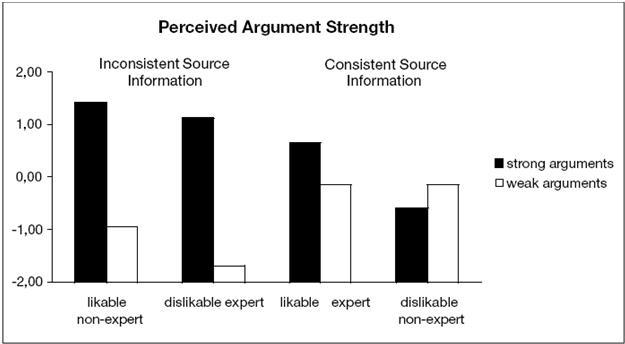
Persuasion and the Internet
By: Daniel Pine, Michael Sedoti, and Tezra Warren
Home
Website Design
Message Strength
Credibility
Mood
References
Persuasive Message Strength
Argument strength can be defined as the amount of impact an argument has on one’s own opinions. The strength of an argument is objective; different people may see an argument as being stronger or weaker than what another person would think. Strength can also be altered by other variables, such as the argument source’s likability, expertise, and the argument’s consistency. These variables come together to determine the overall persuasiveness of the argument.
In an experiment done by Ziegler and Diehl (2001), participants rated different sources based on their expertise, likability, and overall argument quality. In the expert source conditions, the source was a college professor who did work in a field known as “international education research”. As for the non-expert source conditions, the source was a librarian. His work was described as keeping order in the library and checking out books. Both men were given the same name and had worked at the same schools, as well as currently being at Eberhard-Karls-University in Tuebingen, where the study was taking place.
In the likable source condition, the source praised the university in Tuebingen, its students, and the local environment. The dislikable source condition was the polar opposite situation: He openly expressed dislike for the university, its students, and the environment that the university was in. The argument being made was rated in quality in terms of strong or weak, and consistency was defined as having a likeable expert with a dislikable non-expert, with inconsistent information being in the opposite conditions.
Figure 1 (Ziegler & Diehl, 2001)
Figure 1 shows arguments in the strong argument condition were typically perceived as significantly stronger than the arguments in the weak argument condition by the participants, except in the dislikable non-expert condition. Arguments in the strong condition were rated higher overall in the inconsistent condition. There were no significant differences in ratings in the consistent source condition. These results show that a source’s likeability and expertise have a large impact on an argument’s perceived strength.
The strength of arguments can affect persuasion in many areas, including online. Duthler and Palmgreen (2003) found that involved participants favored stronger arguments. However, argument strength had no significant effect on uninvolved participants. In an online environment, you are going to have many different types of audiences. If you are displaying a particular type of message or product, then you may have to cater to a highly involved audience. If you are, it is wise to have stronger arguments for your message or product. For a real life example: Chicago Tribune
